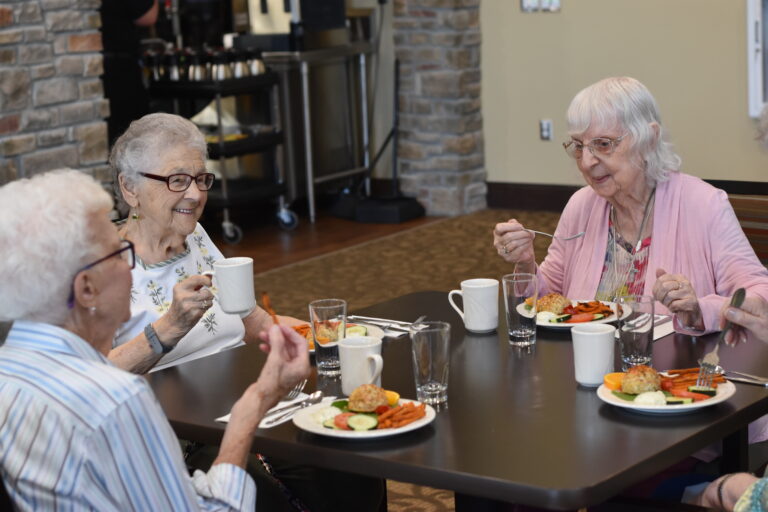
Did you know that a simple urinary tract infection, or, “UTI” may cause confusion in seniors? This topic is absolutely another one of those “elephants in the room.” The thought of a UTI is anything but heartwarming and easy to talk about, but it’s important to know the symptoms.
For seniors, UTIs can create some alarming surprises. If you suspect a UTI, it’s very important to seek medical advice quickly.
Find Senior Living Near Me
For adults, well-known symptoms like running into the bathroom constantly and not being able to go very much might be the cue that a UTI is on the horizon. For seniors, however, a UTI can be a bit more complicated. UTIs in seniors may present with those symptoms, but they could also bring out aggressiveness, words you’ve never expected to hear from your loved one, falls, or signs and symptoms that cause you to think the worst: “Is it dementia?” If given the chance, we would all much rather have a UTI instead of a memory loss diagnosis!
Let’s review what UTIs are, how they present differently in seniors, and better yet, how they can be prevented.
What is a UTI?
Urinary tract infections, or UTIs, are infections of the urinary system involving the bladder, kidneys, ureter, or urethra. UTIs are usually caused by bacteria.
Find Senior Living Near Me
Symptoms of UTI in seniors:
- Fever
- Changes in behavior (sometimes aggressiveness)
- Cloudy, dark-colored, or blood-tinged urine with an odor
- Loss of balance/falls
- Confusion
- Forgetfulness
- Agitation
- Fatigue
- Incontinence
- Decreased appetite
- Weakness
Typical Symptoms of a UTI in adults:
- Frequent urination
- Full feeling in the bladder
- Burning sensation
- Dark or cloudy urine
- Pain or pressure in the lower back or abdomen
What you’ll notice about the lists of symptoms is that they’re different for seniors. When UTIs strike, our senior loved ones may not act like themselves. It’s important to advocate on their behalf if they may not be able to tell us what’s wrong. If you suspect a UTI in your senior loved one, reach out to their healthcare professional for help to develop an appropriate plan of care as soon as possible. If you know that your senior loved one has had a history of UTIs, or if they’re at risk, it’s very important to share that information with their healthcare staff and any caregivers who help them.
Reporting some of the common behaviors or indicators your loved one may present at the start of a UTI can be crucial for them to receive early interventions like diagnosis and treatment. Early treatment of a UTI may prevent the risk of complications such as a worsening infection, an infection that spreads to the kidneys, kidney damage, or sepsis (which can lead to significant complications, including death).
The following may increase the risk of getting a UTI:
- Dementia
- Poor hygiene
- Incontinence
- Being an older female
- Catheter use
- Diabetes
- Having an enlarged prostate
- Weakened immune system
- Kidney stones
How to prevent UTIs:
Practice good hygiene by thorough hand washing, showering, cleaning up after toileting, and wearing clean clothing. If you have to use the restroom, go. Try to avoid waiting long periods to let your bladder sit full. Drink plenty of fluids. Try to remain active through exercise. Limit alcohol and caffeine, and avoid smoking. Try to eat a diet that helps you avoid constipation, and drink plenty of water. While drinking eight glasses of liquids per day is helpful, paying attention to the color of your urine so that it’s clear may also be effective in gauging your hydration needs.
If your senior loved one is unable to complete preventative measures such as adequate personal care, consider finding some help at home or additional daily support, so that they can proactively avoid getting UTIs, injuries, or other health complications.
Edgewood Healthcare partners with several specialty healthcare providers who provide support to seniors on-site in our communities. Aspire Clinical Intelligence has developed unique software to help healthcare professionals at some Edgewood Communities track health problems for seniors, such as their risk for UTIs and other infections.
The goal of the software is to identify potential health and safety risks early so clinicians can put interventions in place. Once a clinician identifies a resident as being at risk for infections, measures can be put into place for that resident to receive education, prevention, and risk reduction, or if medically necessary, treatment for the infection.
By properly managing chronic conditions such as UTIs, seniors may have more independence and joy during their golden years. At Edgewood, we notice that seniors are not feeling like themselves. From our front desk staff to our maintenance techs to our business office staff, we notice, and we’re all here to help.
Reach out to us at Edgewood Healthcare to learn more about our short- and long-term support for seniors at info@edgewoodhealthcare.com.




